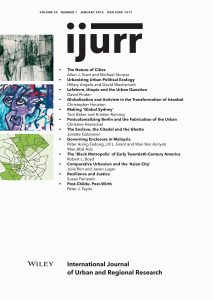Urban political ecology (UPE), an offshoot of political ecology that emerged in the late 1990s, has had two major impacts on critical urban studies: it has introduced critical political ecology to urban settings, and it has provided a framework for retheorizing the city as a product of metabolic processes of socionatural transformation. However, there was another goal in early UPE programmatic statements that has largely fallen by the wayside: to mobilize a Lefebvrian theoretical framework to trouble traditional distinctions between urban/rural and society/nature by exploring urbanization as a global process. Instead of following this potentially fruitful path, UPE has become bogged down in ‘methodological cityism’ — an overwhelming analytical and empirical focus on the traditional city to the exclusion of other aspects of contemporary urbanization processes. Thus UPE’s Lefebvrian promise, of a research program that could work across traditional disciplinary divisions and provide insights into a new era of planetary urbanization, has remained unfulfilled. In this article we trace UPE’s history to show how it arrived at its present predicament, and offer some thoughts on a research agenda for a political ecology not of the city but of urbanization.
Details
Written by:
Hillary Angelo, David Wachsmuth
Digital Object Identifier (DOI)
10.1111/1468-2427.12105
About DOI
Read full article as PDF
Read full article as HTML
See the references for this article

